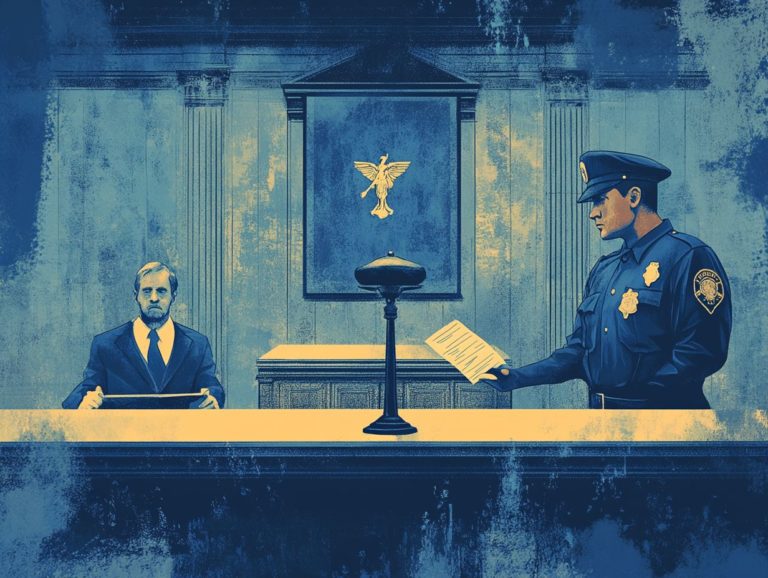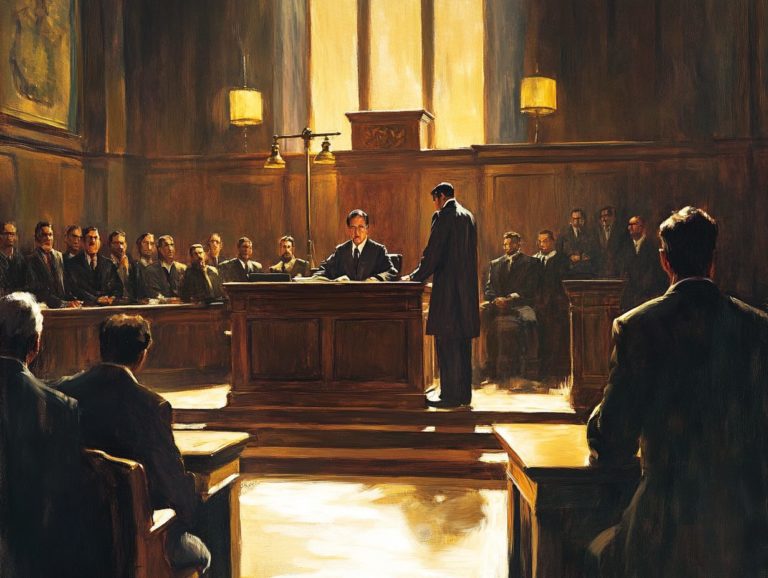How to Understand Your Charges?
Understanding your charges can feel overwhelming, but mastering this knowledge is crucial for effective financial management.
This article will simplify the different types of charges you might face, ranging from fixed and variable to one-time and recurring expenses. It delves into how these charges are calculated, the factors that influence them, and the best practices for reviewing your billing statements.
Should you encounter any discrepancies, you ll find helpful guidance on disputing incorrect charges. Now is the time to boost your financial knowledge and take charge of your finances!
Contents
Key Takeaways:

Understanding Your Charges
Understanding your charges in a criminal case is essential for understanding the legal system, particularly within the context of criminal court proceedings in North Carolina, where the district attorney files the charges.
This journey typically begins with an arraignment. It may also include several pretrial activities and can end in a trial and sentencing if the case proceeds.
Familiarity with these stages can profoundly influence your legal representation and the eventual outcomes you face.
What are Charges?
Charges represent formal accusations brought forth by the district attorney, signaling that you have allegedly committed a misdemeanor (a less serious crime), felony (a serious crime that can lead to prison), or infraction under North Carolina law.
These categories of offenses vary greatly in both severity and the potential consequences you may face.
Misdemeanors can include actions like petty theft or simple assault, typically resulting in penalties such as fines or short-term jail sentences.
In contrast, felonies cover more serious offenses like robbery or murder, which can lead to substantial prison time and hefty fines.
Infractions encompass minor violations, such as traffic offenses, usually resulting in minimal penalties and rarely leading to jail time.
Grasping the distinctions among these types of charges is essential, as they significantly influence the course of legal proceedings and the repercussions you may encounter.
Types of Charges
In the realm of criminal law, you ll encounter three primary categories of charges: misdemeanor, felony, and infraction. Each of these carries its own set of legal consequences and processes.
Understanding these distinctions is crucial as you navigate the legal system.
Fixed Charges vs. Variable Charges
Fixed charges refer to specific penalties established for certain crimes, while variable charges may fluctuate based on various factors, such as the context and severity of the offense.
Understanding these distinctions is essential for you, whether you’re a legal practitioner or a defendant.
For example, fixed charges are often applied in cases of misdemeanors like petty theft, where the law dictates a set fine or a predetermined jail term.
In contrast, variable charges come into play in situations like assault, where the sentence can be influenced by the degree of injury inflicted or the presence of aggravating factors such as whether the victim was a minor.
These distinctions not only shape the legal strategy that defense attorneys might employ but also significantly impact the overall sentencing process. This knowledge can help you prepare more effectively for your case in court.
One-Time Charges vs. Recurring Charges

One-time charges come from a specific incident. Recurring charges arise from repeated offenses and can lead to severe legal consequences.
In criminal law, understanding these distinctions is crucial. When facing a one-time charge, your legal representation typically focuses on minimizing the penalties related to that singular event. However, dealing with recurring charges dramatically shifts the dynamics.
Repeat offenses carry more weight. They often result in harsher sentencing outcomes and complicate your defense strategy. Your legal team must navigate through the established pattern of behavior while striving to emphasize any factors that can lessen the severity of your sentence.
The landscape of sentencing becomes more intricate with each additional legal infraction. Previous convictions can significantly influence the judge’s ability to make decisions and the overall outcome.
How Charges are Calculated
Calculating charges in a criminal case involves considering various factors. These include the nature of the offense, your prior criminal history, and the presence of either factors that can lessen the severity or those that can increase it.
Each of these elements plays a pivotal role in shaping the potential sentencing outcomes you may face.
Factors that Influence Charges
Factors influencing charges in a criminal case encompass the evidence gathered, the gravity of the crime, and any circumstances that may sway judicial discretion.
The credibility and reliability of witness testimonies can significantly influence the prosecutor s choices regarding the charges to be filed. When corroborating evidence is present, it adds substantial weight to the allegations, increasing the likelihood that serious charges will be pursued.
A defendant s prior criminal record often plays a crucial role. Previous offenses can lead to enhanced penalties or a more aggressive prosecutorial approach.
All these elements create a complex interplay that ultimately dictates the outcome, influencing not only the charges but also the trajectory of the case in court.
Reviewing Your Charges
Reviewing your charges is vital for your success in court. It enables you and your legal representation to thoroughly assess the court record, leading to a clear understanding of the implications tied to the criminal charges filed against you.
This diligence aids in your defense and ensures you are fully informed as you navigate the legal process ahead.
How to Check Your Charges
To check your charges, access your court record or police report for detailed information about the criminal charges filed against you.
Understanding the specifics of these documents is essential, as they contain critical details that can significantly influence your legal journey.
Start by visiting your local courthouse, where public records are typically available for inspection. Many jurisdictions now offer online databases, making it easier to access court documents from home.
You can obtain police reports from the respective law enforcement agency, usually requiring a formal request. Knowing this information empowers you to build a strong defense, seek legal counsel skilled in criminal law, and gain clarity on potential outcomes.
Disputing Charges

Disputing charges demands a strategic approach. It is often best navigated with the guidance of legal representation.
This method is essential for effectively addressing the charges during court appearances, as it can profoundly influence the outcome of a criminal case.
Steps to Take if You Believe Charges are Incorrect
If you believe your charges are incorrect, your first step should be to gather evidence to support your claim. Consulting with your legal representation can help you craft an effective response.
Begin by collecting all relevant documentation. This includes bills, contracts, and any previous correspondence that might clarify misunderstandings. Carefully note any discrepancies in the charges, including dates and amounts, to build a solid case.
Discussing these findings with your legal counsel can be instrumental in strategizing the best approach to address the situation, whether through negotiation or preparing for court appearances.
Keeping your information organized and accessible will streamline discussions with your attorney. It will also strengthen your defense against the incorrect charges.
Understanding Your Billing Statement
Understanding your billing statement is crucial for managing your legal expenses effectively! It provides a breakdown of the charges filed against you and the legal fees associated with your court-appointed attorney.
By grasping these details, you can take control of your financial responsibilities and make informed decisions about your legal situation.
Key Elements to Look For
When examining your billing statement, focus on key elements like legal fees, payment options, and charges associated with court appearances or additional services.
As you review these statements, pay attention to the details of each charge. Understanding the services rendered such as research, consultations, or court filings promotes transparency during the legal process.
If you encounter discrepancies, such as unexpected charges or unclear billing practices, it s vital to address them immediately! This vigilance helps you manage legal costs effectively while improving your relationship with your legal representative.
Frequently Asked Questions
What are the different types of charges that I should be aware of?

There are several types of charges you may encounter, including monthly fees, transaction fees, interest charges, and penalty fees. Understanding each type is important as it affects your overall charges.
How can I view my charges?
You can view your charges by checking your credit card statement, bank statement, or online account. This will show you a breakdown of each charge and the amount you owe.
What should I do if I don’t understand a charge on my statement?
If you come across a charge you don’t recognize or understand, reach out to the company or financial institution that issued the charge. They can provide more information to help you understand it.
Why are my charges different each month?
Your charges may vary each month depending on your spending habits, interest rates, and any additional fees applied. Reviewing your charges monthly is important to ensure they are accurate.
How can I avoid unnecessary charges?
To avoid unnecessary charges, track your spending, pay your bills on time, and understand the terms of your financial accounts. Contact your financial institution to see if any fees can be waived or reduced!
Spot an error on your statement? Here s what to do!
If you notice an error on your statement, contact your financial institution immediately. They can investigate the error and potentially reverse the charge if it was made in error.
Take control of your financial literacy today! Understanding your charges and managing your statements can save you from unnecessary stress and costs.






